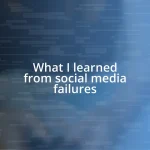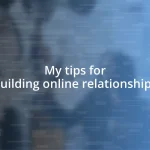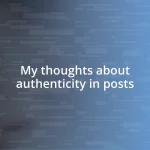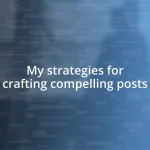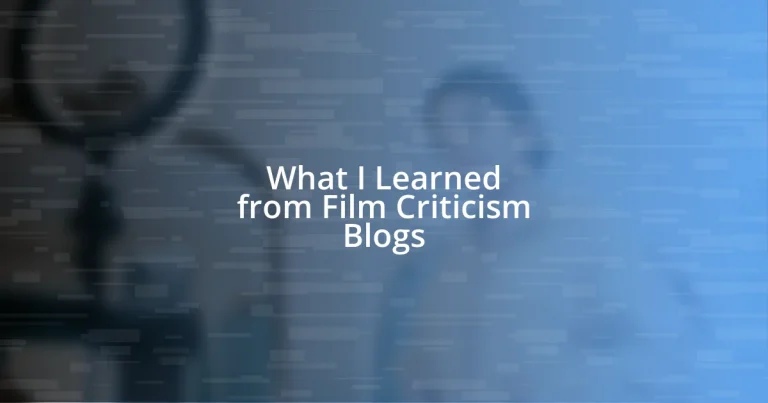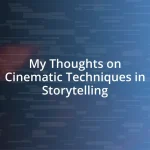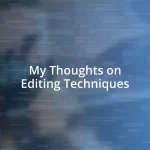Key takeaways:
- Film criticism blogs enrich the viewing experience by offering diverse interpretations, fostering community and sparking important discussions about cinema’s role in culture.
- Engaging with different critique styles, such as philosophical and humorous analyses, allows for deeper emotional connections and personal reflections related to films.
- Applying critique to one’s own creative work promotes self-reflection and growth, encouraging writers to meticulously analyze their style and continually evolve their craft.
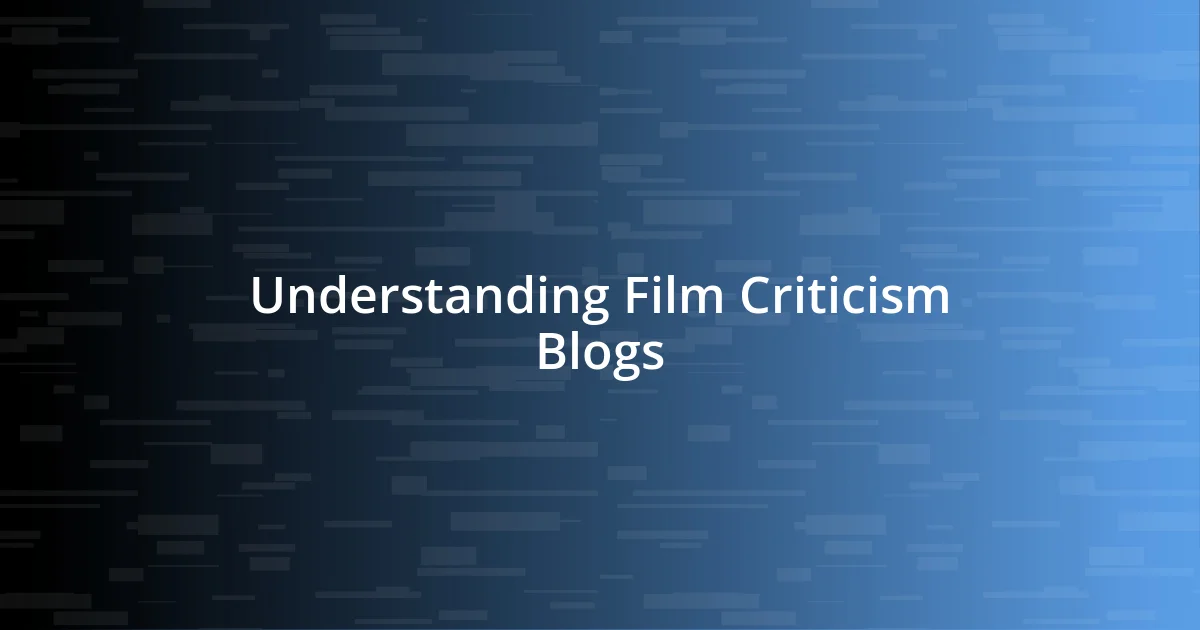
Understanding Film Criticism Blogs
Film criticism blogs serve as a vibrant platform for diverse voices, each interpreting cinema through their unique lens. I remember the first time I stumbled upon an insightful blog that analyzed a film I adored; it opened my eyes to themes I never considered. This experience brought home the realization that these blogs don’t just critique films; they spark conversations about art, culture, and societal values.
When engaging with a film criticism blog, I often find myself pondering how personal experiences shape our understanding of cinema. It’s fascinating to think about how the same movie can evoke a completely different response from one viewer to another. For instance, after reading a critic who connected a film to their childhood memories, I couldn’t help but reflect on how my own past influences my perception of storytelling.
The beauty of film criticism blogs lies in their ability to foster community among film lovers. I relish reading comments and discussions that unfold beneath a review, as they often reveal new interpretations and shared passions that deepen my appreciation for the art. Have you ever discovered a new favorite film through a passionate discussion sparked by a critic’s take? I certainly have, and those moments remind me of the collective journey we embark on as audience members navigating the cinematic landscape together.
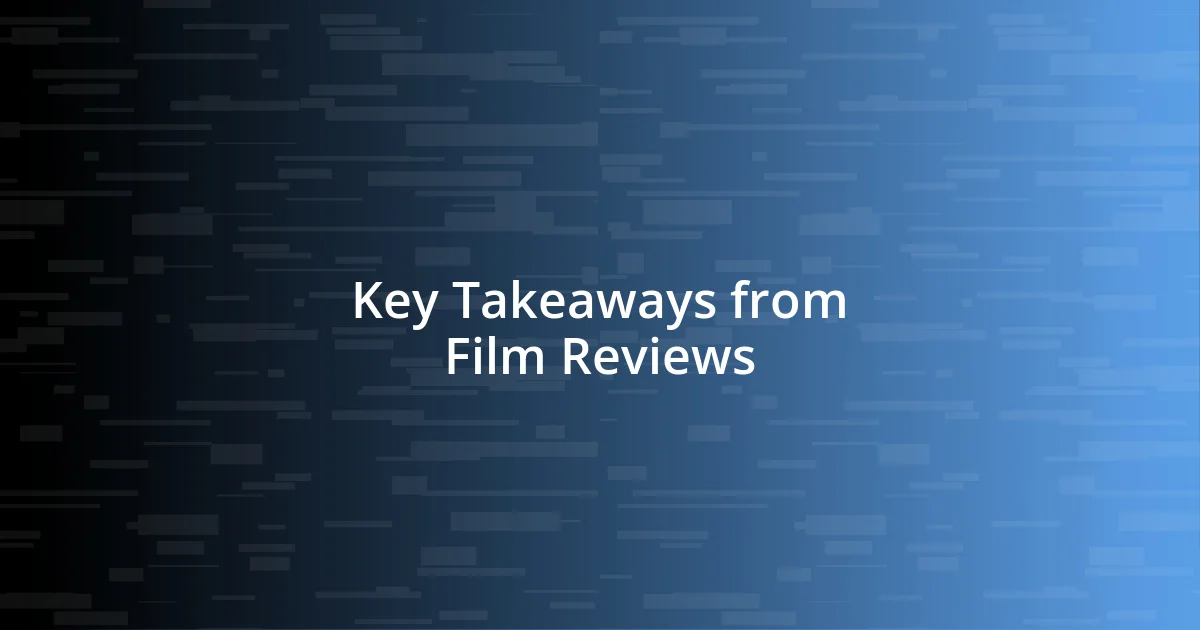
Key Takeaways from Film Reviews
Film reviews have a remarkable way of distilling complex narratives into digestible insights. I remember reading a review that dismantled the intricacies of a film’s plot arc, shedding light on nuances I initially overlooked. It made me appreciate how a well-structured review can often serve as a guide, enhancing my understanding of the film’s thematic layers.
The emotional resonance conveyed through a critic’s evaluation can significantly influence my viewing choices. There was a time when a critic described a movie’s soundtrack as a character in itself; this perspective compelled me to revisit the film, listening with a new ear. It’s amazing how a single observation can shift my entire appreciation of a cinematic piece, highlighting the power of articulate criticism.
Film critics also have a knack for connecting cinematic experiences to broader cultural conversations. When I encountered a review that linked a movie to current societal issues, it triggered a realization of how cinema can reflect and challenge our realities. Have you ever considered how films impact societal narratives? I certainly have, and it deepened my understanding of the role cinema plays in shaping public discourse.
| Aspect | Value from Reviews |
|---|---|
| Plot Understanding | Distills complex narratives into insights |
| Emotional Influence | Shifts appreciation for soundtracks |
| Cultural Context | Links cinema to societal conversations |
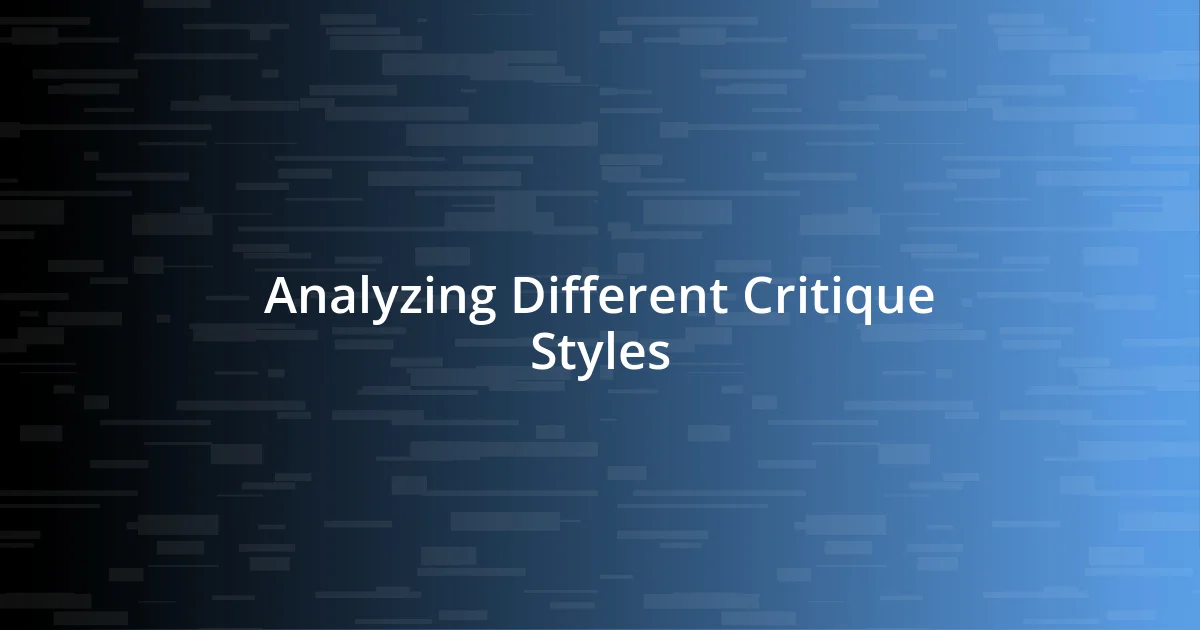
Analyzing Different Critique Styles
Engaging with different critique styles can be a fascinating exploration. I’ve encountered blogs that approached films with a philosophical angle, dissecting themes like existentialism and morality. This kind of analysis transforms a movie into a deeper conversation about life, making me feel like I’m joining an intellectual dialogue. Contrarily, I’ve also read critiques that leaned heavily on humor, providing hilarious takes on films that often made me laugh aloud.
Here are some critique styles that have caught my attention:
- Philosophical Analysis: Examines underlying themes and moral questions.
- Humorous Commentary: Delivers witty insights that entertain while critiquing.
- Technical Breakdown: Focuses on cinematography, editing, and special effects.
- Personal Connection: Reflects on how the film resonates with the critic’s life experiences.
One striking example of a personal connection critique was when a blogger shared how a coming-of-age film mirrored their own high school experiences. That particular perspective resonated with me deeply, as I recalled my own childhood struggles and triumphs. It made me realize how film has the power to unearth memories and feelings I thought I had tucked away. This kind of emotional insight helps us appreciate cinema on a much more intimate level.
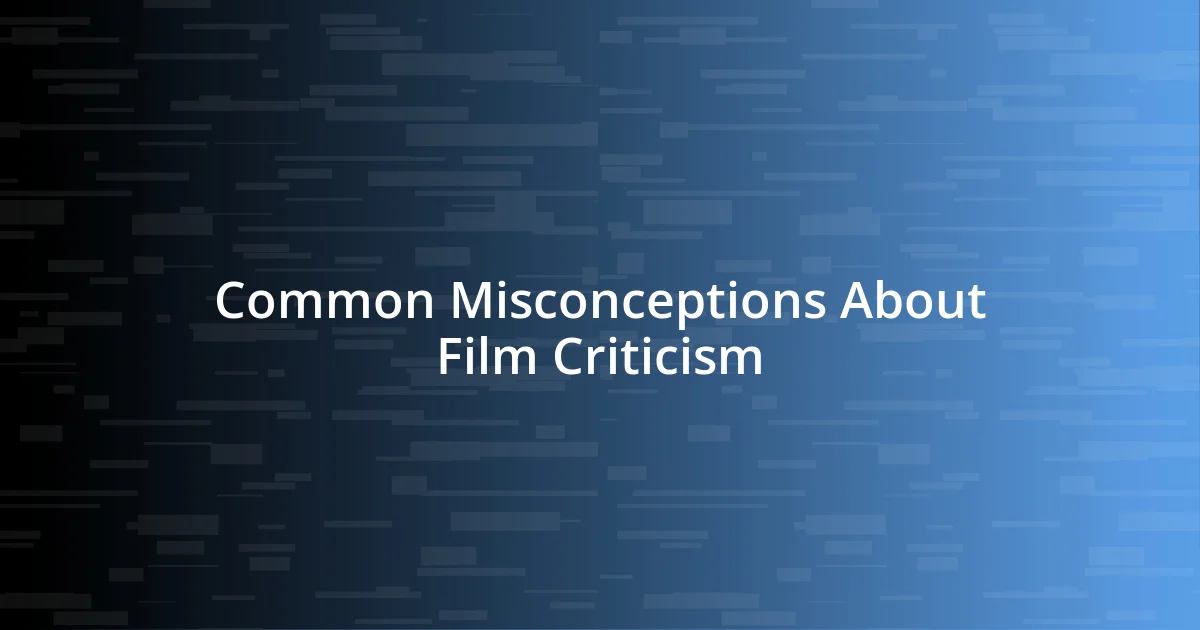
Common Misconceptions About Film Criticism
One common misconception I’ve encountered is that film criticism is purely about expressing opinions. Many people assume critics just share their likes and dislikes, but it’s often much deeper than that. A thoughtful review, in my experience, involves analysis and context that can elevate your perception of the film.
Another misunderstanding is the belief that critics have to adhere to strict guidelines or formulas. I once believed I had to follow a certain structure to write a valid review. However, over time, I learned that writing about films can be expressive and personal. Each critic brings their unique voice and experiences, which can enrich the dialogue about a film.
Some folks think critics have to be experts with formal education in film studies to provide valid insights. It’s not always the case. I’ve read reviews from self-taught enthusiasts whose passion and perspective resonated with me just as much, if not more, than those from seasoned professionals. Have you ever found a gem of a review from someone simply writing out of love for cinema? I certainly have. It reminds me that everyone has a unique lens through which they view stories, and that diversity can lead to richer conversations.
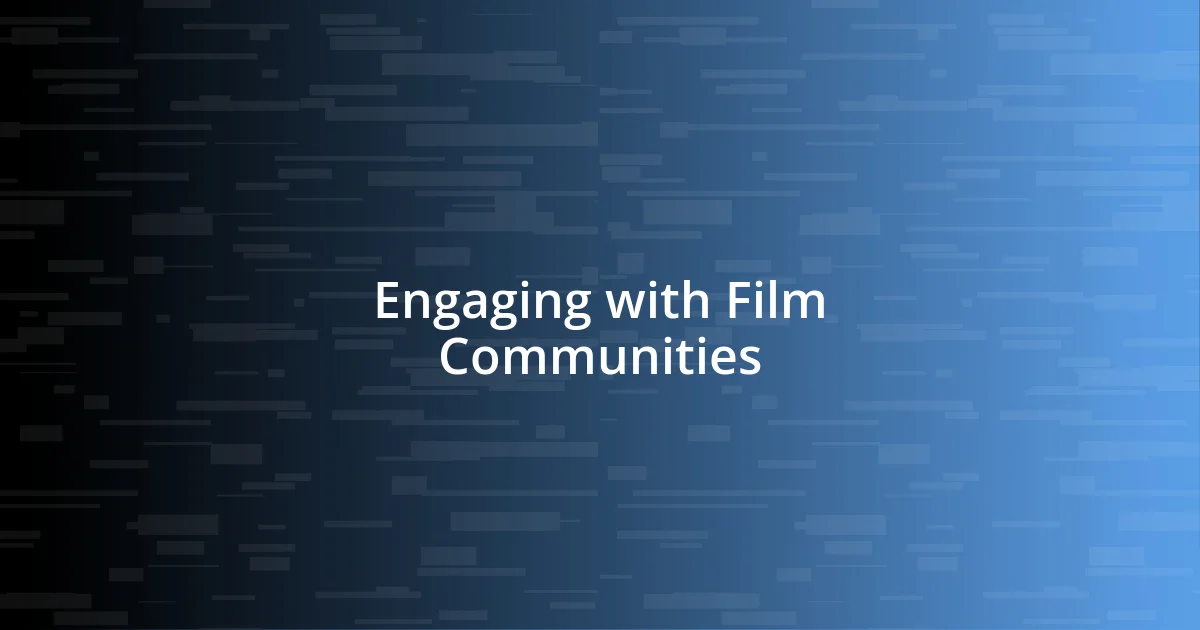
Engaging with Film Communities
Engaging with film communities can be a transformative experience. I remember the first time I joined an online cinema forum; it felt like stepping into a new world where every opinion mattered. I couldn’t help but dive into discussions about my favorite films, discovering alternative viewpoints I had never considered before. Have you ever shared a different perspective on a film and found others were eager to explore it? It really opened my eyes to the idea that cinema is a multifaceted conversation, not just a personal reflection.
Interacting with these communities also encouraged me to take a more critical approach to my viewing. I often found myself analyzing not just the film’s plot, but how others perceived it, which deepened my own understanding. For instance, during a lively debate over a controversial movie, someone shared a completely different interpretation of a character’s motivations. It inspired me to revisit the film, and wow, I discovered layers I hadn’t seen initially. That process of revisiting and discussing films with others enhances our viewing experience, creating richer connections with the content and each other.
What’s particularly fascinating is how film communities help foster a sense of belonging. I’ve met people through these spaces who share my passion, sparking friendships that extend beyond movie discussions. Reflecting on the time I organized a local film screening, I realized the joy of connecting over shared passions is profound. That evening of laughter, debates, and emotional connections made me appreciate how cinema not only entertains but unites us. Have you ever felt that strong connection with others over a shared love for film? Engaging in these communities has taught me just how powerful collective experiences can be.
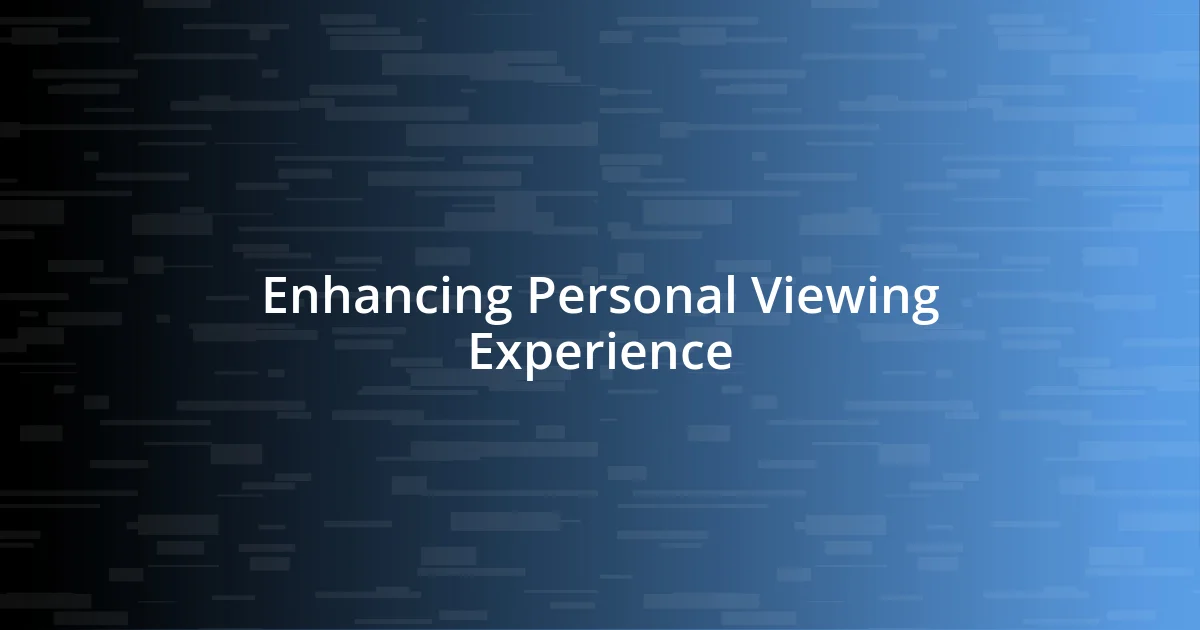
Enhancing Personal Viewing Experience
Exploring film criticism blogs has truly transformed how I experience movies. I vividly remember the first time I read a review that delved into the cinematography choices of a film I loved. It made me notice the details I hadn’t paid attention to before, like the significance of light and shadow in creating mood. Have you ever watched a film twice and noticed completely new elements? That’s the magic film critique can bring; it encourages you to look deeper.
I’ve found that engaging with different perspectives enhances my ability to connect emotionally with a film. For example, after reading a heartfelt review of a poignant indie flick, I was moved to tears in a way I hadn’t anticipated. The writer’s personal experiences and reflections echoed my own, making me feel more deeply connected not just to the film, but to the broader human experience it portrayed. Isn’t it fascinating how someone else’s words can bring out raw emotions we might otherwise overlook?
Ultimately, these insights have led me to approach films with a more open mind. Instead of just consuming narratives, I now actively seek out deeper meanings and themes, whether it’s through analyzing character arcs or understanding cultural contexts. I remember discussing a classic movie with my friends while pointing out societal issues the film addressed. The conversation turned into an impassioned debate that enriched our understanding of both the film and each other’s viewpoints. Have you ever experienced such an insightful conversation? It’s those moments that truly make viewing a shared and enlightening experience, turning solitary watching into a collective journey of discovery.
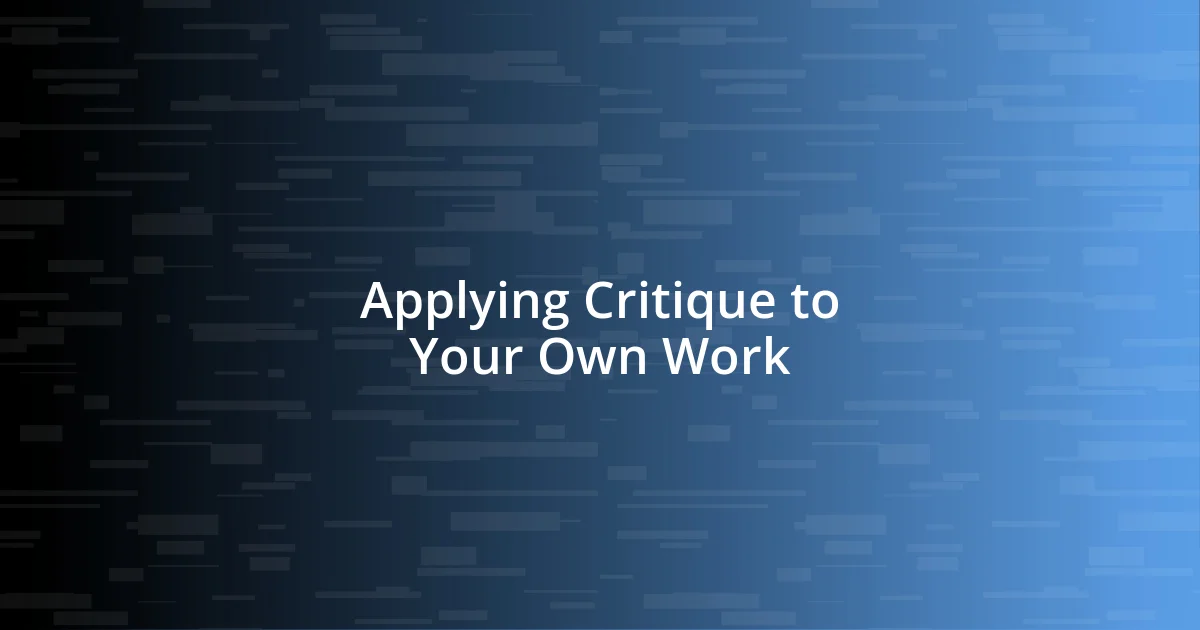
Applying Critique to Your Own Work
Applying critique to our own creative work can be immensely valuable. When I first started writing my own film reviews, I often felt overwhelmed by the thought of others dissecting my opinion. It wasn’t until I began to analyze my favorite critics that I realized how constructive feedback could strengthen my voice. Have you ever felt nervous about sharing your thoughts? Embracing that vulnerability became a stepping stone for my growth as a writer.
The process of reviewing others’ work taught me the importance of detail. I remember sitting down with a film I was passionate about, dissecting every scene and dialogue. This meticulous attention made me reflect on my writing style. For instance, if I praised a critic’s ability to create vivid imagery, I asked myself whether I was successfully doing the same in my reviews. Are there moments in your writing that could benefit from deeper visual engagement?
Importantly, critique fosters self-reflection. I often keep a journal of feedback and insights I gather from various film analyses. One evening, I revisited an earlier piece I wrote after engaging with a particularly compelling blog. It was enlightening to see how far I’d come, but also revealing to identify areas that still needed work. Has examining your past work ever surprised you? That realization about my growth not only gives me confidence but also ignites a passion to continually refine my craft. Engaging with critique becomes less about comparison and more about personal evolution.




